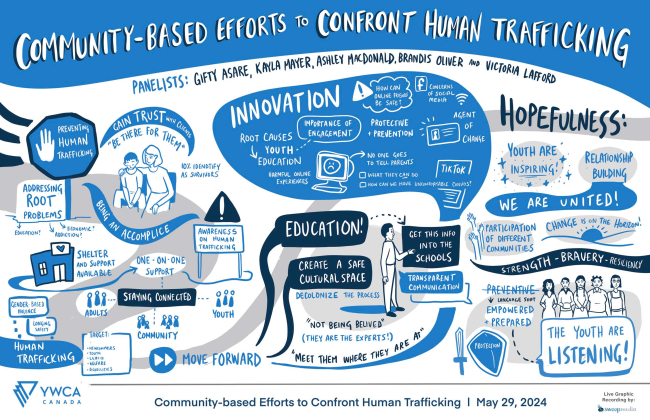Read: 3min
In late May, YWCA’s Violence Against Women Staff Network virtually gathered to advance sector knowledge and practices to support survivors of human trafficking. Through the powerful intervention of Gifty Asare, Director of Research and Community impact at WomenatthecentrE, Kayla Mayer, Director of Programs for YWCA Niagara Region, Ashley MacDonald, Youth & Employment Services Manager at YWCA Moncton, Brandis Oliver, Memengwaawag AHT Liaison for Giishkaandago’Ikwe Health Services, and Victoria Lafford, Former Peer Outreach Worker for the Nova Scotia Transition & Advocacy for youth program (NSTAY) at YWCA Halifax, participants learned about community interventions and tools on how strengthen our collective action against human trafficking grounded in lived experiences. Let’s delve into some insights from this event.
The conversation began with a powerful poem from Victoria Lafford, sharing her own experience and emphasizing the importance of creating spaces of trust, safety, and stability for survivors. Victoria highlighted the need to support people in their daily lives, such as “trips to appointments, to the courts, to the food banks, or even grocery shopping because a lot of the people that have experienced human trafficking have no idea how to go grocery shopping – so we are there to help them.”
Gifty Asare discussed the importance of projects by and for survivors of human trafficking, highlighting the only pan-Canadian project to date: Embedding Resilience & Grounding Resistance from WomenatthecentrE. This project accompanies and supports survivors in their process and unique needs and is consistently improving daily to meet the needs of survivors.
As for Kayla Mayer, she discussed YWCA Niagara Region’s tireless work to provide immediate housing support to all survivors. Using a harm reduction approach, with low-barrier facilities and client-centered support, survivors can begin their healing process in a safe and supportive environment. Both YWCA Niagara Regions’ work and the “Embedding Resilience & Grounding Resistance” project show that, together, we can advance the fight against human trafficking by providing a consistent response and message to survivors using best practices while coordinating services that are available.
However, in certain provinces and territories, services may be rare, and organizations may not be able to support as many survivors as they wish. Ashley highlighted the specific challenges of New Brunswick as an example of an area with limited and remote service points, making access and knowledge of these services difficult. She stressed the importance of raising awareness of this issue in schools among children, adults, parents, and community members.
Brandis Oliver insisted on the need to make this issue known and to share how to recognize it, “I’ve learned so much about Human trafficking in my few years in the sector that I found out I was a survivor of human trafficking myself 20 years ago. I had no idea that it happened to me. With this survivor perspective and with the ton of programs we have, we are prepared and able to support survivors throughout their healing path”. Ashley and Gifty highlighted that traffickers are targeting girls, women, gender diverse folks, and more specifically, immigrants, newcomers, refugees, individuals who are using shelters, and 2SLGBTQIA+ individuals. The importance of rapid and widespread awareness is imminent.
It is through the central role of the Brave YW approach that Ashley shared the importance of raising awareness and preventing human trafficking among young people at risk. Raising awareness among young people helps build peer support to prevent dangers as young people are more inclined to turn to their friends, rather than their parents due to fear of uncomfortable discussions or punishments.
Although this topic is often concealed and rarely discussed, it is everyone’s responsibility to raise awareness and prevent human trafficking to protect members of our communities. Each person has a role. YWCA Canada works to prevent and eliminate human trafficking as well as support survivors and those working directly with them.
Watch the recording here: https://register.gotowebinar.com/recording/8897451941168156676
Would you like to read more blog posts? Check out our feminist agenda !
The graphic recording was created by the talented Laura Hanek
